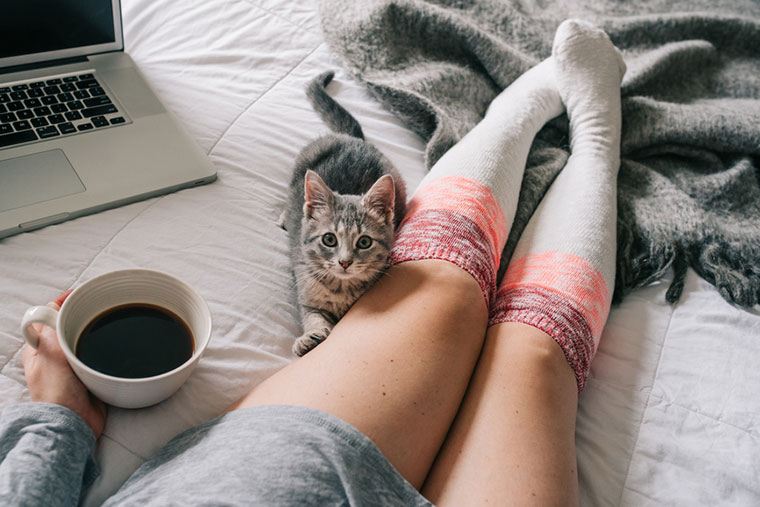How Many Days Do You Wear Socks
It's nearly that magical time of the year where feet start sweating and sloshing in the snow, and a little bit of neglect could lead to serious problems. Although you try to be as hygienic as possible when it comes to changing out of gym clothes post-workout, it's easier to neglect day-to-day foot care. And when it comes to a personal question like—how often should you change socks—during the throes of winter, it isn't automatically obvious to everyone. By "everyone," I mean me specifically.
So, just how often should you change socks? "That's easy, every day," my roommate Emily posited during dinner. "Wait, really," I asked, my brows furrowing. "Every day?" "Yes, every day," Emily said, weirded out. "Do you not change them every day?" "Uh, no, I literally wear whatever the hell I can find in my room, half the time my socks don't even match," I said.
Now granted, I mainly wear dresses and tights, so while I am undeniably gross, I'm also a little less gross than that sounds. But determined to find out where on a 1-to-10 scale I fell, I consulted a podiatrist, who lit the path forward on how to care for your feet, and specifically how often to change out of socks. Here's the intel.

If you're battling Athlete's Foot, change your socks frequently
One thing became certain from Yolanda Ragland, DPM, a New York City-based podiatrist and foot surgeon and founder of FixYourFeet.com from the get-go. If you have Athlete's Foot, you can't be so nonchalant about sock changes. Yes, that between-the-toes cracking and dryness so often associated with the locker room, occurs no-matter your activity level, due to a charming fungi that affects the top layer of the skin through small cracks or wounds. Anywhere between 15 to 25 percent of the population suffer from it at any given time.
Related Stories

"If you suffer from fungal infection of the foot, chances are you also suffer from sweaty feet," she says. "Changing your socks twice daily is recommended. However, simply changing your socks will not prevent Athlete's Foot because the fungal organism is extremely hardy." So, you should also wash them with every sock change, and once they're dry, use an anti-fungal cream to keep even more microbes from showing up to the party.
If you're not dealing with Athlete's Foot, there's still a solid rule that you should change your socks everyday (sorry! sorry!) to keep bacteria and, yes, fungus from greeting you, too.
It may seem cozy, but don't layer socks
You know how when the temperatures drop to bitter levels, you decide to layer pairs over pairs of socks in the effort to fight frostbite? Yeah, you want to not. "In the winter months, the feet get cold quickly because, after all, they are the part of the body that is closest to the ground!" says Dr. Ragland. "Layering socks might sound intuitive, but keeping the foot too warm will trigger sweating and bacteria, especially since fungus thrives in warm, dark, moisture conditions. Unless you are in subzero weather, there is no need to layer socks—they will only encourage microorganisms to propagate and could result in itchy malodorous feet." Oh my God, I haven't even been wearing my gross socks correctly.
Pick a fabric that's kind to your feet
So now that layering socks on socks is out of the question, what is the warmest, cleanliest material? Despite the fact that everyone always kvells over cotton (the fabric of our lives and all that jazz), it doesn't wick moisture as well as a synthetic.
"Think about it—all of your workout apparel is made out of synthetic materials, not cotton," she says, because synthetics tend to absorb moisture quicker and return to regularly scheduled dry programming. "The same goes for socks. Look for thermal socks specializing in soaking up the sweat and keeping feet dry."
So regardless of the situation you're in, I wonder if there's one type of sock that reigns supreme for foot cleanliness. Ultimately, "wearing a sock specializing in wicking and absorption is your best option," said Dr. Ragland. "Merino Wool socks are great—this [is] natural fiber, which means it is breathable and can mechanically transport moisture and vapor from a higher area of humidity by the skin to a lower area of humidity away from the skin.
Additionally, Merino can retain up to 30 percent of its weight while feeling dry." She also vouches that a synthetic fabric like Olefin can work, "but can only boast that it retains up to 7 percent of its weight." Duly noted. Maybe someone could put a pair or 14 in my Christmas stocking.
To go with those super spiffy socks, here are the coziest slippers ever and here's why to keep your shoes by the front door to keep your house clean.
How Many Days Do You Wear Socks
Source: https://www.wellandgood.com/how-often-should-you-change-socks/
0 Response to "How Many Days Do You Wear Socks"
Enviar um comentário